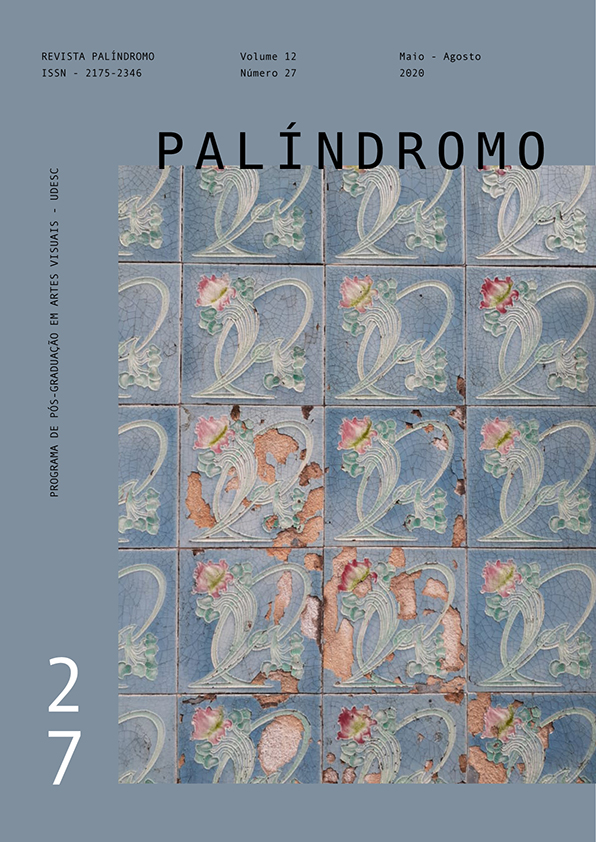Do ornamento ao design total: um panorama histórico a partir de Hal Foster
DOI:
https://doi.org/10.5965/2175234612272020056Palavras-chave:
Hal Foster, Ornamento, Design Total, Art NouveauResumo
Este artigo retoma o polêmico texto “Design e crime”, de Hal Foster, para delinear um breve panorama histórico acerca das relações entre a ornamentação do Art Nouveau e o que o autor denomina “design total”. Para tanto, revisito o debate oitocentista em torno do ornamento e explico como o culto à personalidade emerge com a ornamentação da vida pública. A partir disso, sustento que a difusão do design na vida contemporânea está atrelada a uma conduta do “designer de si”. Assinalo, por fim, a atualidade da provocação de Foster, indicando que, na contramão das narrativas que expõem o design como superação do ornamento, o design segue operando em larga medida à guisa de uma racionalidade ornamental.
Downloads
Referências
BAUDRILLARD, J. Para uma crítica da economia política do signo. Rio de Janeiro: Elfos, 1995.
BROWN, W. Nas ruínas do neoliberalismo: A ascensão da política antidemocrática no Ocidente. São Paulo: Politeia, 2019.
COSTA, J. F. O vestígio e a aura: corpo e consumismo na moral do espetáculo. Rio de Janeiro: Garamond, 2005.
DARDOT, P.; LAVAL, C. A nova razão do mundo: ensaio sobre a sociedade neoliberal. São Paulo: Boitempo, 2016.
DELEUZE, G.; GUATTARI, F. O anti-Édipo: capitalismo e esquizofrenia. São Paulo: Editora 34, 2010.
FLUSSER, V. O mundo codificado: Por uma filosofia do design e da comunicação. São Paulo: Cosac & Naify, 2013.
FOSTER, H. Design e crime. ARS (São Paulo), v. 9, n. 18, p. 48-59, 2011.
____. O retorno do real: A vanguarda no final do século XX. São Paulo: Cosac Naify, 2014.
FOUCAULT, M. Nascimento da biopolítica: curso dado no Collège de France (1978-1979). São Paulo: Martins Fontes, 2008.
____. “As técnicas de si”. In: ____. Ditos e Escritos Vol. IX: Genealogia da Ética, Subjetividade e Sexualidade. Rio de Janeiro: Forense Universitária, 2014.
GROYS, B. Self-design and aesthetic resposibility. E-Flux, ed. 7, p. 1-8, 2009. Disponível em: http://worker01.e-flux.com/pdf/article_68.pdf. Acesso em 22 dez. 2019.
JONES, O. A gramática do ornamento: ilustrado com exemplos de diversos estilos de ornamento. São Paulo: SENAC, 2010.
LATOUR, B. Um Prometeu cauteloso? alguns passos rumo a uma filosofia do design (com especial atenção a Peter Slotedijk). Agitprop: revista brasileira de design, São Paulo, v. 6, n. 58, jul./ago. 2014.
LOOS, A. Ornamento e crime. Lisboa: Cotovia, 2004.
MARX, K. Grundrisse. São Paulo: Boitempo, 2011.
NIETZSCHE, F. A gaia ciência. São Paulo: Companhia das Letras, 2012.
PAIM, G. A Beleza sob Suspeita: o ornamento em Ruskin, Lloyd Wright, Loos, Le Corbusier e outros. Rio de Janeiro: Jorge Zahar, 2000.
PODRO, M. The Critical Historians of Art. New Haven: Yale University Press, 1982.
RIEGL, A. Problemas de estilo: Fundamentos para una historia de la ornamentación. Barcelona: Gustavo Gili, 1980.
RUSKIN, J. The Stones of Venice – Volume I: The Foundations. New York: Cosimo, 2007.
SENNETT, R. O declínio do homem público: as tiranias da intimidade. Rio de Janeiro: Record, 2014.
SMILES, S. Self-help: With Illustrations of Character and Conduct. Boston: Ticknor and Fields, 1863. Disponível em: <https://archive.org/details/selfhelpwithill00smilgoog/page/n5>. Acesso em 22 dez. 2019.
WORRINGER, W. Abstraction and Empathy: A Contribution to the Psychology of Style. Chicago: Ivan R. Dee, 1997.
Downloads
Publicado
Como Citar
Edição
Seção
Licença
Copyright (c) 2020 Marcos Namba Beccari

Este trabalho está licenciado sob uma licença Creative Commons Attribution 4.0 International License.
DECLARAÇÃO DE DIREITOS AUTORAIS
a. Os artigos publicados pela revista são de uso gratuito, destinados a aplicações acadêmicas e não comerciais. Todos os direitos autorais são atribuídos à revista. Os artigos cujos autores são identificados representam a expressão do ponto de vista de seus autores e não a posição oficial da Revista Palíndromo. O (s) autor (es) compromete-se sempre que publicar material referente ao artigo publicado no Palíndromo mencionar esta publicação da seguinte forma:
Este artigo foi publicado originalmente pela revista Palíndromo em seu volume (coloque o volume), número (coloque o número) no ano de (coloque o ano) e pode ser acessado em: http://www.revistas.udesc.br/index.php/palindromo
b. Plágio, em todas as suas formas, constitui um comportamento antiético de publicação e é inaceitável. A revista Palíndromo utiliza o software iThenticate de controle de similaridade


